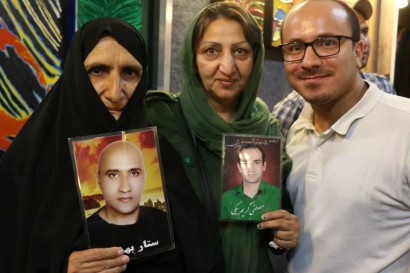Iranian Dissident Filmmaker Emad Tayefeh Seeks U.S. Asylum
Life in Iran, post nuclear “deal,” is worse than ever for dissidents.
This week I read about Emad Tayefeh (pictured above with fellow Iranians whose relatives are victims of the regime), a filmmaker who recently escaped to Turkey from Iran after making a film to document the work of fellow dissidents and human rights activists in Iran. At present, he continues to be hunted by members of Iran’s Revolutionary Guard while he awaits his VISA to immigrate to the U.S. He has asked for U.S. citizens to “write to the U.S. State Department to encourage them to process his application faster,” according to Irina Tsukerman, a New York-based human rights attorney who has advocated for his asylum claim over the past year. Tsukerman recommends writing directly to U.S. Secretary of State John Kerry on Tayefeh’s behalf.
Here is a bit of his story: after he entered university at 22, Tayefeh met human rights activists who spoke out against the regime’s authoritarianism and brutality.
“I decided to make a film and be an activist for human rights and political issues,” Tayefeh told The Huffington Post recently. “I wasn’t afraid anymore.”
His film, Public Enemies, interweaves four different storylines: the untold stories of those who have been victims of Iran’s regime for the past 37 years; the stories of famous activists in Iran who have been jailed; a perspective on Iran’s current situation; and his personal experiences— “as a political prisoner and activist. And as a young man that had a dream for himself, and now has nothing,” according to The Huffington Post.
While working on the film, Tayefeh and his crew were attacked by Iran’s Revolutionary Guard. “The guards broke my left wrist and right shoulder, they beat my head and they broke my camera too,” he told The Huffington Post.
They jailed him in Iran’s notorious Evin Prison, and psychologically tortured him, forcing him to watch executions – and to live, nightly, in fear of his own.
Miraculously, he was released and, despite the dangers, he resumed filming on a cell phone camera, then fled to Turkey, where he awaits U.S. State Department approval to immigrate to the U.S.
Tayefeh, 30, has also been involved in clandestine efforts to organize cooperation and communication among Jewish-Americans, Israelis, and Iranians, according to Tsukerman, who has been working to raise awareness about his case for the past year.
At Shomal University, Tayefeh founded an organization called The Art Club, which, under the guise of extracurricular cultural activities, promoted communication between Iranians and young Israelis, and staged political events, including film screenings tied to International Women’s Day.
“Emad and his colleagues sought to learn the goals, dreams, and interests of their Jewish and Israeli peers and to break down the mutual stereotypes and prejudices perpetrated by the Iranian regime,” Tsukerman wrote recently in the Times of Israel, documenting the work, in addition to filmmaking, for which Tayefeh has been repeatedly jailed and tortured.
At present, Tayefeh, who is in Turkey, awaits State Department permission to immigrate to the U.S.
“We want to encourage the State Department to process his application faster and to give him permission to come in,” Tsukerman told me this week in a phone interview. “He is a very hardworking guy with a great desire for freedom. He is a Muslim who believes Islam is in need of major reforms.”
Tsukerman, who has volunteered her time advocating for Tayefeh in various media, added the U.S. would be fortunate to have “someone like him, a Muslim asylum seeker who supports U.S. values.”
At a time when Ben Rhodes, Obama’s deputy national security advisor for strategic communications, has been called out for admitting to spinning the reality that the Obama Administration’s dealings with Iran’s government in striking the Iran deal predated the election of the so-called “moderate” Iranian leadership, and Republican front runner Donald Trump has called for a temporary ban on Muslim travel and immigration to the U.S., one sane, humane policy both political parties could embrace would be to help clearly identifiable Muslim dissidents, who share our values, to join us here.
Surely our statecraft and nation would benefit greatly from the courage and moral example of a remarkable individual like Emad Tayefeh.
This entry was written by Heather Robinson and posted on May 19, 2016 at 9:11 pm and filed under Blog. permalink. Follow any comments here with the RSS feed for this post. Keywords: Ben Rhodes, Donald Trump, Emad Tayefeh, Iranian regime. Post a comment or leave a trackback: Trackback URL. */?>




